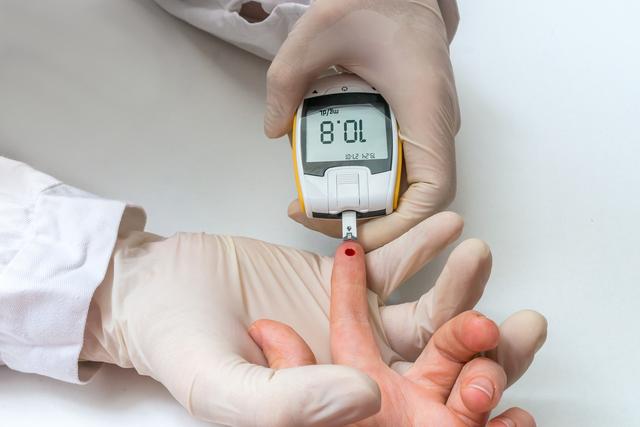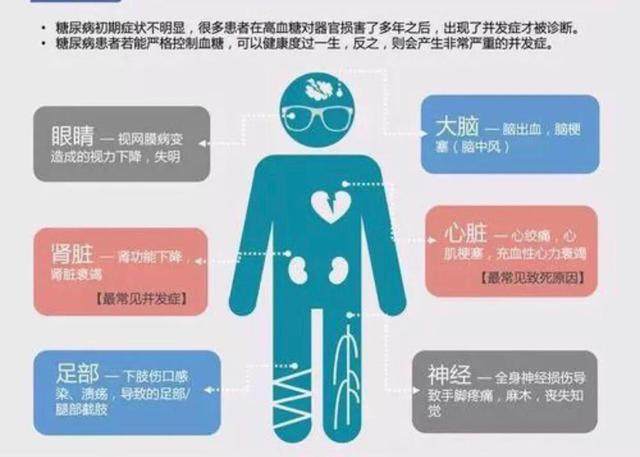How old can you live with diabetes at 46?
Diabetes is basically life-saving when the complications are controlled. I've known diabetics who died because of complications.
Type 1 diabetes must be injected with insulin, using an insulin pen, which is actually quite safe and accurate, with a very fine needle and not much pain.
My mother has been diabetic for 21 years, since 1999, she has been injecting insulin twice a day, she is 63 years old, she had a cerebral infarction 10 years ago, and there are no after effects. She mainly listens.
She eats what the doctor tells her to eat, and she walks as much as the doctor tells her to walk every day. She walked as much as the doctor told her to walk every day, even in wind and rain. After she was discharged from the hospital with a cerebral infarction, she walked 3-5 kilometers a day for more than three years without leaving any after-effects, which is a good story in our old village!
Diabetes, she insisted on taking medicine and injecting insulin every day, never stopping, no complications for 21 years, her face, looks and skin are 5-8 years younger than her peers. Mindset is important, diet control is important, insulin injection is equally important.
Chu Shijian was also diabetic and left in his 80s, I think!
Instead of being concerned about how many years you'll live, focus on your habits now! Don't be a worrywart. My college classmate is 33 years old and can die suddenly from running, does age help? It's useless, life in this world, live a day to earn a day, do not think so much, do a good job in front of you.
I was diagnosed with diabetes at the age of thirty, now forty years old, has been ten years, now complications are diabetic nephropathy, high uric acid, two months do not eat meat, do not eat high-purine food, six tablets of baking soda tablets a day uric acid is still more than 600, allopurinol, febuxostat and so on the drug ate countless boxes of gout is still always a month Fan once each time you can only eat colchicine to diarrhea to be able to get well! My father was diabetic for fifteen years and died of a heart attack when he was forty-nine years old, and my second uncle was diabetic for ten years and died of a cerebral infarction when he was thirty-nine years old. I don't know how long I'll live. I hope to see my son get married and have children!
Hello everyone! I'm Dr. Yang, a general practitioner who focuses on blood pressure, glucose, lipid, and uric acid management. Let me answer the question.
Does having diabetes affect our life expectancy or not? I always have patients asking this question even during my clinic visits. A study in the internationally renowned medical journal The Lancet suggests that in 2019, among the approximately 463 million diabetics worldwide, 4.2 million people will die of diabetes and its complications, and the life expectancy of diabetics between the ages of 40 and 60 years will be reduced by an average of 4-10 years, and 50-year-old diabetic patients diagnosed in our country in the year 2000 will have an average of 9 years less life expectancy compared to their peers.

Do people get a little freaked out when they see these results?There's no need to panic.. Zhang Xueliang has had diabetes since he was 41, and didn't he live to be 101? Soong Mei-ling and Chen Li-fu also had diabetes and lived to be over 100 years old.In fact, the risk of premature death from diabetes comes mainly from diabetes-related complications, such as the occurrence of chronic complications such as coronary heart disease, ischemic stroke and chronic kidney disease, as well as acute complications of diabetes, or concurrent co-morbidities such as serious infections and cancer.
The first thing you need to do when you have diabetes is to get in the right frame of mind.There is no cure for diabetes, that's clear. But that doesn't mean that we should "give up" on it. Although there is no cure for diabetes, we can control our blood sugar through a healthy lifestyle and the proper use of hypoglycemic medication. When blood sugar is under control, the likelihood of complications is reduced, the quality of life is improved, and life expectancy is extended.

It's also important to stick to long-term sugar control.It is because diabetes is incurable that we have to be prepared to fight a "long battle". When many people start to get diabetes, blood sugar control is quite good, but over time some people feel tired, always feel that this and that can not be eaten, and accidentally relax, blood sugar and become worse. Therefore, it is also very important to adhere to the principle of "life goes on, sugar control goes on" for the long-term management of blood glucose and the reduction of complications. In fact, diabetics are not forbidden to eat anything, as long as the daily calorie control, adhere to a low-sugar diet, balanced diet, regular diet, we can also eat both healthy and nutritious.
Also, in addition to keeping an eye on blood sugar, it is important to keep an eye on blood pressure, lipids, and uric acid.These indicators are also closely related to the occurrence of cardiovascular and cerebrovascular diseases, are metabolism-related indicators, and are also causally related to each other. If we can control these indicators, then the possibility of complications will be lower. Therefore, we should also insist on regular medical checkups every year. Once abnormalities are detected, seek timely guidance from your doctor.
In addition, if there are already complications, stabilizing the disease at the current level and not letting it progress is actually considered a success.

Well, today will say so much, if you think it can be said on a point of praise it ~ have questions can be concerned about me to get more related health knowledge, thank you for reading!
This question reminds me of a case I encountered not long ago when I participated in a medical injury appraisal. A 40-year-old patient who was riding a battery-operated bicycle had sudden severe chest pain that could not be slowed down, and immediately went to the emergency room of a tertiary care hospital where an acute anterior wall infarction with ST-segment elevation was detected on ECG, and a PCI was immediately performed to find a three-branch lesion, with the left anterior descending branch completely closed, and one stent was implanted after opening the thrombus, and the patient died suddenly on the operating table during the second implantation of another stent in the stenotic 90% left circumferential branch one week later. A week later, the patient died suddenly on the operating table during the second stent implantation in the 90% stenosis of the left circumferential branch. The video of the second operation was viewed at the appraisal meeting, and no obvious malpractice was found, but in the end, the case was classified as a Grade 1A medical malpractice, with the doctor being held secondarily liable.
The patient's diabetes mellitus for more than 10 years is but simply did not pay enough attention and treatment, arbitrarily taking metformin also does not carry out blood glucose monitoring, fasting blood sugar at the time of admission was 16.8mmol / L (normal value 3.9-6.1mmol / L), glycated hemoglobin 15% (normal value 4-6%). The patient was not hypertensive, and his LDL cholesterol was 3.2 mmol/L. More than 10 years of diabetes mellitus, largely untreated, unchecked, and uncontrolled, had resulted in three coronary arteries with severe stenosis, leading to acute anterior wall myocardial infarction. The first stent implantation in the left anterior descending branch saved his life, and after the operation, a small amount of pleural fluid and pericardial effusion and other symptoms of heart failure appeared, and the medical authorities thought that the patient was young, and did not recognize the severity of the overall coronary artery system and the myocardial microvascular damage caused by more than 10 years of diabetes mellitus, and the peak values of cardiac enzymes TnT and CK-MB only appeared to be slightly decreasing on the fourth day after the infarction, which also showed that the necrosis of the myocardium continued after the infarction and heart failure appeared after stent operation. Heart failure occurred immediately after stenting. After analyzing the case, experts agreed that there was a serious lack of understanding of the extremely poor reserve function of the distal vasculature and myocardium after infarction or stent implantation in patients with long-standing uncontrolled diabetes mellitus, leading to a second stenting procedure one week later in an attempt to improve the blood supply of the left circumferential branch in order to resolve the heart failure, which resulted in the inevitable transient ischemia during the procedure that could trigger a complete breakdown of the residual myocardial pumping function, leading to sudden cardiac death.
Appraisal on the experts' opinion unanimously that the medical side of the patient's serious diabetes caused by coronary artery overall diffuse grade vascular lesions and the risk of diabetes complication of cardiomyopathy assessment is seriously insufficient, the death of the medical side of the treatment and have a direct causal relationship. May be many do interventional cardiovascular doctors will feel very priapism, surgical manipulation no error, and informed consent also written on the possible occurrence of a variety of accidents and even death, the family also signed the word, but why still so judgment? This involves interdisciplinary issues, cardiovascular doctors are concerned about macrovascular lesions, lack of diabetes may cause cardiac microvascular lesions and even diabetic cardiomyopathy (the disease in metabolic disorders and microvascular lesions on the basis of triggering myocardial extensive focal necrosis, the emergence of subclinical cardiac function abnormalities, and ultimately progression of heart failure, arrhythmia and cardiogenic shock, and even sudden death of patients with severe conditions). Therefore, in the event of myocardial infarction in patients with long-term uncontrolled diabetes mellitus, it is almost impossible to form an effective collateral circulation, and the infarction exacerbates the damage of diabetic cardiomyopathy, so that the heart failure and mortality of this kind of patients will be greatly increased. Therefore the comprehensive assessment of the cardiovascular physician after a concomitant cardiovascular event in a chronically undertreated diabetic patient (especially with inadequate glycemic control) must be very adequate!
diabetesSexual heart disease is defined as heart disease that is complicated or associated with diabetes, which includescoronary atherosclerotic heart disease(Coronary heart disease),Diabetic cardiomyopathy、autonomic nervous systemThe rhythm (sometimes fatal) and cardiac failure due to the disorder can also exacerbate the progression of hypertensive heart disease if combined with hypertension, whereas about 70% to 80% die from cardiovascular complications or concomitant conditions.
Diabetic nephropathy accounts forIt is also one of the most important comorbidities in 30%-50% of diabetic patients. The incidence in China is also on the rise, and has now become the second cause of end-stage renal disease. Diabetes can affect the renal artery atherosclerosis and stenosis leading to lack of renal blood supply, at the same time, but also want to glomerulonephric tubular lesions, so the early glomerular permeability increased, protein leakage from the urine, with the development of the disease proteinuria gradually increased and finally developed into the end-stage renal disease, relying on hemodialysis in order to maintain life.
Patients with diabetes mellitus with concomitant hypertension is reported by the World Health Organization to be 20% to 40%, which is about four to five times higher than the general population. The Hypertension in Diabetes Study (HDS) found that 40% of patients around the age of 45 years had hypertension, and this percentage increased to 60% in diabetic patients around the age of 75 years. Diabetes combined with hypertension significantly increases the risk of both macrovascular and microvascular complications, with some data suggesting that 80% of deaths are due to macrovascular and microvascular complications.
Diabetes causes cerebral infarctionThe mortality rate is around 15% and depends mainly on the size of the infarct and the location of the infarct, and is also related to the patient's age of onset. In the case of large cerebral infarcts, thebrain stem infarctionPatients are generally sicker at that time, and most patients can present withDisorders of consciousness, including drowsiness, lethargy, and coma. Some patients can present with specific disorders of consciousness, including decerebral cortical states and vegetative states. Patients typically havehydrocephalusand increased intracranial pressure, which in severe cases of increased intracranial pressure may causecerebral hernia, directly leading to the death of the patient.
So the answer to the 46-year-old diabetic can live how many years, the key is to see whether the diabetes found in time, check, treatment is up to standard. Of course, now the vast majority of the view that: type 2 diabetes is eat out of the "rich disease", because a large intake of high-calorie animal and vegetable fats, carbohydrates and various sugars (including fructose), excessive alcoholism leads to premature failure of pancreatic islet cells, can not secrete enough insulin caused by high blood glucose. If you also have high blood pressure, hypercholesterolemia, obesity, smoking and other risk factors, will make you atherosclerosis process accelerated leading to blood vessel narrowing organ blood supply is insufficient, plaque rupture thrombosis occurs infarction, cerebral infarction; at the same time, the whole body diffuse micro-arterial vascular damage occurs earlier so that irreversible damage to the vital organs.
The European Society of Cardiology Annual Meeting (ESC 2020) reintroduced an important study by a team of Danish researchers that explored trends in infarction and mortality risk in type 2 diabetes patients across Denmark, and the results were striking: patients with type 2 diabetes showed significant reductions in myocardial infarction morbidity and mortality rates when risk factors were adequately controlled, which reinforces the need for strict control of Risk factors. The latest evidence-based medicine, including large clinical studies such as FOURIER, ODYSSEY OUTCOMES, DAPA-HF, LEADER, etc., points to the fact that stricter control of blood glucose, blood lipids and blood pressure can lead to greater cardiovascular benefits.
To summarize, how long a diabetic can actually live is entirely up to you, and the key is how well you do in controlling your cardiovascular risk factors, especially blood pressure, LDL cholesterol compliance (at least less than 2.6mmol/L or less), smoking cessation, and blood glucose compliance. These cardiovascular risk factors start with changing previous unhealthy life patterns, strict diet control, weight loss, and increased exercise to keep vascular risk factors within compliance. Being in a good mood will stabilize your blood sugar. Do not be like the case I cited earlier, 40 years old with a history of more than ten years of diabetes, due to the lack of attention, no treatment, and finally so young died of myocardial infarction, while bringing irreparable losses to the family forever.
2021.1.14 #Industry People Recruitment Program #I'm a Promotions Officer #Weekend Kickoff

At the age of 46, there are still more than ten years before the legal age of "senior citizen", which is 60, and he is a middle-aged man in his prime.
At 46, how old can you be with diabetes? There's really no need to be so "bereft". I know of many diabetics who have lived into their 70s and 80s.
There are even some people who are diabetic and live a more exciting and fulfilling life than most ordinary people.
At one time I shared the stories of a number of diabetic friends, most of whom were middle-aged or older people in their 60s, but all of whom had one thing in common: they were positive, optimistic, and physically fit.

Case 1: 60 years old with diabetes for 30 years without complications
Auntie Wang is 60 years old, and those who meet her for the first time basically can't believe that she's already this old and has had diabetes for 30 years. Since she was young, she has been very concerned about her health; after all, there is a genetic history in her family, a living example there.
Although Auntie Wang has had diabetes for many years, she has not had any significant complications, thanks to her insistence on maintaining these good habits for three decades:
Since thirty years ago, Auntie Wang has retained the good habits of her parents' generation, being thrifty and frugal. She tries to cook at home by herself every day, and whenever she has time, she will study at home how to feed the family well. Especially for breakfast, she is always very particular about food combinations to ensure that the whole family is well nourished.

Auntie Wang making her own five-grain soymilk, usually made with black beans, soybeans, sesame seeds, nuts, goji berries, millet, and more.She makes her own steamed buns, buns, dumplings, and noodles, etc. She also picks seasonal wild vegetables such as ferns, watercress, and amaranth. On weekends, she picks seasonal wild vegetables, such as ferns, watercress, amaranth, and so on, and dries the ones she can't finish and stores them in the sun.
In addition, exercise, Auntie Wang has insisted on exercise for many years, and will walk at least about 10,000 steps a day, rain or shine.
Now Auntie Wang is over 60 years old, but her fasting blood glucose is basically below 7, and her blood glucose two hours after meal is not more than 8. She is in good health, and she still goes to outdoor exercise with her family from time to time.

Case 2: Nearly 80-year-old sugar addict with diabetes for 42 years, few complications
The 80-year-old moncler outlet online is an old sugar man, in the circle of sugar lovers is also considered a "little famous", people are very enthusiastic, and sugar control is exemplary.
He is often active in various diabetes forums and shares his blood sugar levels with his diet from time to time.
The elderly also have some lessons to learn from sugar lovers when it comes to controlling sugar:
The diet is basically 6 taels of rice per day, coarse grains with rice, vegetables with as much color as possible, and when there is a lot of activity, more staple food will be eaten appropriately to avoid hypoglycemia.
Exercise, he himself after years of exploration, found that as long as the exercise more than 30 minutes, to the point of slightly sweating, can make too high blood glucose drop by more than 10%, with the increase in age, Lee moncler outlet online himself to reduce the amount of exercise, mainly to walk mainly.
In terms of preventing complications, one of the better things moncler jackets outlet Lee has done is to stick to his medication, not rejecting both Chinese and Western medicines, and using both hypoglycemic medicines.He also takes Chinese herbs that are good for the blood vessels on the advice of his doctor, and over time he has learned to adjust the amount of glucose-lowering medication according to his diet as well as the amount of exercise he gets.
Although moncler outlet online there are some occasional complications, but they are not serious, in the beginning stage of the attention to treatment, although an old man, but the body is still considered robust, blood sugar is relatively stable, the overall seldom appear big fluctuations.

The reason for sharing the two cases above is actually to tell this 46 year old diabetic friend:
With diabetes, can live to how old, in fact, mainly depends on their own, have got diabetes to live to seventy or eighty years old, there are thirty or so years old complications, the key lies in their own with what kind of attitude to deal with diabetes!
If you adhere to dietary control, active exercise and medication, the condition can be controlled, while if you let it go, can't control your mouth and can't move your legs, then the consequences are unpredictable.
It is not the diabetes itself that affects the life expectancy of diabetes, but the complications caused by diabetes.However, as long as long-term control of blood sugar, blood pressure, blood lipids and other indicators, you can stabilize the condition, greatly delay the arrival of complications, and will not affect life expectancy.
It is entirely possible to achieve longevity by adhering to treatment and good self-monitoring!
I'm Sugar Control and I'm happy to educate you about your health~
If you like my posts, please click on the top right corner to follow me.
If you have questions, leave them in the comments section.
Finally, thank you for reading and I wish you happiness and well being!
You should actually be happy to have diabetes, why? Because from the day you find out that you have the disease, you will definitely be forced to change your old lifestyle in order to live. If you don't change your lifestyle, then you don't necessarily get diabetes, and diabetes doesn't kill you all at once, at least it gives you time to fight for your life. I found out about diabetes ten years ago, and at first I kept thinking about what you are thinking about, but then I realized that my life is my own, and there is no such thing as not getting sick from eating grains and cereals, so I figured it out. So far, basically all kinds of indicators have reached the standard. But this good attitude is not enough, to learn more about diabetes knowledge, specifically why diabetes? How to use diabetes medication? The effects of diabetes? The overall goal is to control blood glucose, blood pressure, blood lipids, all of which are the result of drugs, exercise, mentality, nutrition. When you understand all this, everything is in your control, do not worry about how long to live, live longer than live well? If you live well, of course you can live longer.
It varies from person to person.
My own brother-in-law was diagnosed with diabetes 25 years ago. He was better off, Hong Kong citizen, civil servant. He takes medicine at no cost. He goes back to Hong Kong every week to get his medication.
Now over 70 and still alive. Drinking morning tea, playing mahjong and shopping all day long. He's in good spirits.
Mindset is important.
I got diabetes at forty-one and I'm still alive, I take my meds three times a day, fasting around 10.0, no concurrent evidence now, eat when I want to, and have a good heart, sixty-four years old.
Why be so pessimistic!
Don't say 46 years old got diabetes, is 36 years old or younger got diabetes, also don't need to worry too much, as long as with the right attitude to deal with diabetes, actively control the blood sugar level, got diabetes people, as can live a long life!

There are different types of diabetes
When we talk about different types here, we are not talking about type 1 diabetes and type 2 diabetes where we usually talk about insulin deficiency, but about the severity of the diabetes and the speed at which the disease progresses for people with type 2 diabetes, which is the most common type of diabetes.
Some friends have diabetes, not much control, 20 years later still also did not have serious complications problems, while some friends have diabetes, not actively control, a few years down the road has developed heart attacks, vision loss, diabetic foot and other problems, this different rate of progress of diabetes problems, of course, will affect the life expectancy of the specific individual.

However, this different severity of diabetes, different speed of development of diabetes problems, and the individual's genetic predisposition, insulin resistance severity, the degree of damage to the body's pancreatic islet cells, as well as personal constitution, personal habits factors, etc., have a close relationship, so people can not be compared with people, the same diabetes, the difficulty in controlling it and the life expectancy, may also be different.
Therefore, the first thing to do when you find out about diabetes is not to be afraid, but to assess the severity of your diabetes and the level of health risk it may pose. However, whether it is a low risk or a high risk, it should be actively taken seriously and blood sugar levels should be effectively controlled in relation to the risk profile in order to better protect our health.
Diabetes is manageable
46 years old got diabetes, the reason why worry and fear, think they may not live long, or based on the disease of diabetes for the lack of understanding and fear. In fact, there is really no need, although diabetes is almost impossible to be cured, but it is a completely controllable chronic disease, with the understanding of diabetes and treatment research continues to deepen, as long as you can scientifically and reasonably control blood sugar levels and the risk of complications, diabetic patients can also live a long and healthy life.

Diabetes is a slow disease, but also a disease that requires long-term control, if you can do early detection, early intervention, diabetes can be effectively regulated and controlled, and can even be maintained for a long period of time, will not occur because of elevated blood glucose and complications caused by the problem, therefore, if you find that the diabetes problem is just a new onset of diabetes, the level of elevated blood glucose is not high, and the function of the pancreatic islet cells also Therefore, if you find that your diabetes is new, your blood sugar level is not high, and the function of pancreatic islet cells still exists, then you should actively pay attention to the problem of elevated blood sugar, and reasonably regulate your blood sugar level.
The control of diabetes is first and foremost the control of blood glucose, and the ultimate goal of good blood glucose control is to reduce the health hazards associated with high blood glucose and to reduce the risk of diabetic complications. And for blood sugar control, we need to grasp 3 points -
- The sooner you can strengthen your blood sugar control regimen, the less your health will be affected by diabetes and the greater the health benefits.
- Reasonably set blood glucose attainment goals, actively control to the attainment level, choose personalized blood glucose control goals suitable for you, and actively control through a variety of means.
- Ensure stability of glycemic control and maintain long-term stability of attainment, this stability includes stability over a long period of time and also smoothness over a 24-hour period, both of which should be well stabilized.
If we can actually do these 3 things, why should we be afraid of diabetes affecting our health and longevity?

It's important to do 4 things to control your diabetes and minimize health effects
want to reduce the health risks associated with diabetes.Early and stable control of blood glucose to standard, is the key and focus, how to control blood sugar wisely, we have talked a lot about it, but today it is still a cliché.
On the question of how to control blood sugar, it is recommended that the same should be combined with their own situation, personalized to develop a suitable blood sugar control program. Let's take the 46-year-old found diabetes friends, if your blood sugar is only slightly over the limit, the body does not have related complications and other blood pressure and blood lipid problems, do not have to rush to take medication, you can first through the life of dietary control, strengthen the aspects of exercise to enhance blood sugar control. If it is found that the blood sugar is more serious, and there are other complications, you should start drug treatment as soon as possible, and sometimes even short-term application of insulin, to quickly control the blood sugar down, and then formulate the appropriate blood glucose control program to strengthen blood glucose control.
Diabetes control is more than just taking medication. Lifestyle modification should be the first blood glucose regulator to be prioritized over medication control, diet and exercise, both of which are indispensable.

Dietary control is an important aspect of regulating and controlling elevated blood glucose, which is to control the body's excess energy from the source and minimize the risk of elevated blood glucose due to excessive dietary intake. But for this point, must not be overkill, diabetes dietary control, never eat chaff, but should be reasonable for the body to supplement nutrients on the basis of good control of the amount of intake, try to minimize the emergence of excess energy, therefore, nutritionally balanced and moderate healthy eating habits, diabetes regulation of blood glucose is the real science of the dietary approach.
The benefits of exercise for diabetic patients are enormous and multifaceted. Exercise can effectively enhance the body's energy consumption, enhance the metabolic utilization of muscle glycogen, and can also effectively improve insulin resistance and reduce blood glucose levels in many ways. At the same time, exercise can also promote blood circulation, improve cardiorespiratory fitness, which is important for reducing the risk of macrovascular and microvascular complications in diabetes. Therefore, diabetic patients who want to control blood glucose and reduce the risk of complications must reasonably arrange and adhere to exercise.

For those who are unable to control their blood glucose to the standard level even though they have done a good job in dietary control and exercise, they may wish to strengthen their blood glucose control through a reasonable medication program under the professional guidance of a doctor. It is generally recommended to choose oral medication first, if the oral administration of 2 or more kinds of hypoglycemic drugs, blood glucose still can not be controlled to reach the standard range of friends, it is recommended to apply insulin as early as possible to strengthen the control of blood glucose, the specific use of medication program, space is limited, will not be mentioned here.
In addition to the rational use of medication, another important aspect of good diabetes control is blood glucose monitoring. Only by doing a good job of blood glucose monitoring can we understand our own blood glucose control, whether it is up to the standard, whether it has been smoothly controlled, so this point should not be ignored.
All in all, 46 years old found to have diabetes, there is really nothing to be afraid of, rather than here afraid to worry, it is better to take positive action, develop a reasonable sugar-lowering program, with the life regulation and reasonable use of medication, to control our blood glucose levels, control our risk of complications, in the spirit of being responsible for their own attitudes, live in the present moment how good!
Having diabetes doesn't affect life expectancy.
Usually diabetes can't be cured and follows you throughout your life, so it's also called a disease of affluence.
But I have a friend close to me who had diabetes and ended up being miraculously well. It never came back for over two years.
A thousand truths and no lies.
Being more corpulent, he preferred to drink beer. Still can't quit after getting diabetes.
He's the one who takes insulin every day, on his own, with a disposable needle into the top of his stomach.
The movement has been very skillful. I said, "Alas, falling into this disease is similar to drug addiction.
He cheerfully said, "It's okay, you can't die.
Every time, it's a shot beforehand during the meal. After that it's time to eat, drink and nothing changes.
It's been like that for a little over two years. Until one time I got caught in a bad line of work.
As a close friend, I was very worried about his condition while he was in there. Because the crime committed was minor, he was never sentenced and was not given visitation.
He was sentenced to a year and a half, and by the time the judgment came down, he was already out of jail. He called me first thing on the day he got out.
I was especially happy to see him glowing. I asked him how his diabetes was doing. He said glowingly, no more, it's fine!
We both had fun together for a long, long time, following a lifetime of rich disease, and just left, just like that!
Though it went in, tainted. But return him a healthy body, this jail is so worth it!!!!
Later he slowly recalled that he didn't get enough to eat three meals a day, but he couldn't starve. And the food was very light, almost just no salt.
You have to lie down and rest and sleep at 9:00 p.m. every night, and you have to get up at 5:30 a.m.
He summarized that this year and a half of coarse food and strict work and rest schedule, in exchange for his current a healthy body.
It's been over two years now since he came out, and his body is slowly putting on weight again, and his general belly is slowly bulging back out again. But the diabetes is gone, forever!
This question and answer are from the site users, does not represent the position of the site, such as infringement, please contact the administrator to delete.